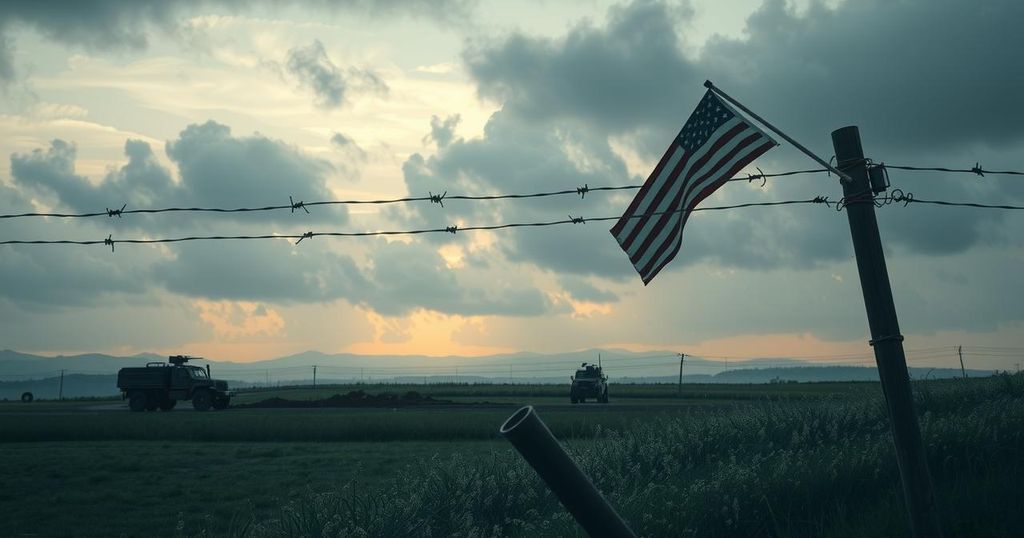World news
6TH SPECIAL OPERATIONS FORCES, 6TH SPECIAL OPERATIONS FORCES REGIMENT, ASIA, CNN, CONFLICT, DAVOS, ENERGY INFRASTRUCTURE, EUROPE, EUROPE/ASIA, ISW, KIM JONG UN, KOREA, NORTH, KURSK, MILITARY, MISSILE ATTACK, NORTH KOREA, OLE, OLEKSANDR KINDRATENKO, PYONGYANG, RUSSIA, SPECIAL OPERATIONS FORCES, SWITZERLAND, UKRAINE, WAR, ZE, ZELENSKY
Elena Martinez
0 Comments
North Korean Troops Withdraw from Russian Frontlines Amid Heavy Casualties
Ukrainian officials confirm that North Korean troops have withdrawn from the frontline in Russia’s Kursk region due to heavy casualties. Approximately 12,000 soldiers were sent, with around 4,000 reported killed or injured. Ukrainian military commanders discuss the outdated tactics employed by North Korean forces, and both countries maintain military collaboration as they face challenges in their operations against Ukraine.
Recent statements from Ukrainian military officials indicate that North Korean troops have been absent from the frontline in Russia’s Kursk region for several weeks, likely due to heavy casualties. Colonel Oleksandr Kindratenko, a spokesperson for Ukraine’s Special Operations Forces, disclosed that the Democratic People’s Republic of Korea (DPRK) forces have not been observed in about three weeks, suggesting a potential withdrawal following significant losses.
It has been estimated that approximately 12,000 North Korean soldiers were sent to support Russian operations in the Kursk region, with reports indicating that around 4,000 of these troops have been either killed or injured. Ukrainian presidential adviser Mykhailo Podolyak commented on the withdrawals, confirming that some North Korean units have retreated after sustaining mass casualties.
North Korean forces have been deployed since November to assist in guarding against incursions from Ukraine. Despite these deployments, Ukrainian President Volodymyr Zelensky claimed that Russian forces could not successfully dislodge Ukrainian troops from the Kursk area, where there are approximately 60,000 Russian soldiers and 12,000 North Koreans.
Zelensky stated that one-third of the North Korean contingent had been killed in action. Reports from CNN highlighted the extreme measures taken by North Korean soldiers in the conflict, including instances where they reportedly detonated grenades to avoid capture and made battlefield pledges of loyalty to Kim Jong Un.
A commander from Ukraine’s 6th Special Operations Forces regiment emphasized that although North Korean troops are young and seem well trained, their combat training appears outdated for modern warfare, specifically referencing their lack of experience with contemporary drone technology. Nevertheless, some North Korean soldiers demonstrated impressive marksmanship skills when engaging drones at short distances.
Despite the challenging circumstances and substantial losses, Russia appears to employ North Korean troops in mass ground assaults. Recent battlefield updates from the Institute for the Study of War indicated that Ukraine has made advancements in Kursk, even as Russian forces claimed to have recaptured certain villages along the border.
Neither the Russian nor North Korean governments have acknowledged the presence of North Korean troops in Russia. Prior to their deployment, Kim Jong Un and Vladimir Putin formalized a significant defense agreement, reinforcing their military cooperation, akin to their Cold War-era alliance.
The article addresses the involvement of North Korean troops in the ongoing conflict in Ukraine, specifically focusing on their deployment to Russia’s Kursk region. It highlights the heavy losses faced by these forces and the impact on their operational status. The analysis includes insights from Ukrainian military officials regarding the tactical adaptations of North Korean soldiers and the broader geopolitical implications of their cooperation with Russia, following a defense pact signed by Kim Jong Un and Vladimir Putin.
In conclusion, the withdrawal of North Korean troops from the battlefield due to significant losses underscores the challenges faced by these forces in modern combat. The partnership between North Korea and Russia marks a renewed military alliance reminiscent of Cold War dynamics. Despite these setbacks, both nations appear committed to their mutual support in the ongoing conflict with Ukraine, as evidenced by their prior defense agreements.
Original Source: www.cnn.com




Post Comment